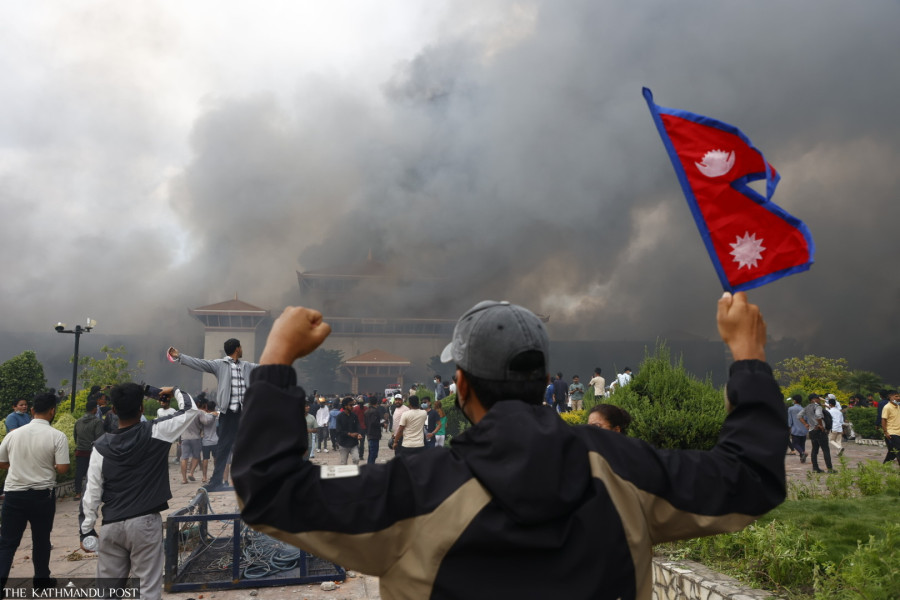Columns
Gen Z as catalysts for change
Urgent investigation and accountability on all major corruption cases are needed.
Bishow Parajuli
Corruption has become rampant in Nepal over the last two decades. Nearly a million youth leave the country for jobs in the Middle East and study abroad due to a lack of opportunities back home. Unfortunately, all institutions set up to provide good governance are captured by the appointment of political party favourites, thus making these institutions dysfunctional with the institutionalisation of corruption. These institutions have become controversial in most of their deliberations, resulting in a declining trust of the general public.
All Nepalis felt proud to witness the Gen Z youth, united in thousands across the country, on September 8. The protest focused on challenging rampant corruption, demanding the resignation of a corrupt and authoritarian government, which had just banned major social media platforms. The peaceful protests turned into the brutal killing of dozens of youths and the injuring of hundreds of students in indiscriminate shootings by the authorities. Infiltrated by people of different political interests, the crowd got out of hand and catastrophically engaged in the burning down of many landmark buildings and private properties.
Prime Minister KP Sharma Oli resigned, opening a new chapter for a fresh political dispensation and rebuilding of Nepal. According to the demand of the youths, former Chief Justice Sushila Karki was appointed the prime minister of the interim government. During this period, the President and the Nepal Army played a positive role in ensuring a peaceful transition.
Having worked in the development field for four decades within the United Nations (UN) across various countries in Asia, Africa and the Middle East, I have witnessed regimes fall in several countries as a result of youth uprisings. Frustrated by a lack of job opportunities, rising food prices and a growing sense of hopelessness for the future, the youths of these countries marched on the streets. The youth uprising in Nepal was the writing on the wall, perhaps exacerbated by the situation in Sri Lanka and Bangladesh.
I wrote an Op-Ed on “Corruption and Nepal’s cry for help” on July 11, 2024, stating, “Corruption…. goes against the people’s aspirations for the overall sustainable development of Nepal, with threats to security, stability, and hard-earned democracy, devolution of power to the local level and failure to achieve the country’s graduation from LDC”. The issue of corruption has also been discussed with many development partners since then, with a focus on its threat to Nepal’s prosperity and value dilution of development aid.
Unfortunately the government ignored the demand of the people and further fanned the fire by banning social media, thus clamping down concerned voices. This became the turning point to say “enough is enough”. Perhaps the government thought sending youth for jobs abroad would avoid trouble at home. If so, the thinking was flawed.
Given the wrong direction in which the country was heading, the youth movement and the resulting transition in government is an opportunity for a new start. All Nepalis must hold tight and take full advantage of this situation to build a truly democratic country.
The caretaker government will need to take extraordinary measures and seek cooperation and support from everyone. It must not hesitate to take necessary measures in amending any legal instruments so as not to restrict the path forward to set the country in the right direction towards fair and free elections. It is critical for the transitional government to swiftly bring all those responsible for the cold-blooded killing and corruption to justice.
For the government to succeed, given its short timeline, it must prioritise actions related to the key aspirations and concerns of all citizens. Likewise, it should also act fast on multiple fronts to deliver its promises and build confidence and trust. All Nepalis must be given equal opportunities to participate in nation building.
Priority must be set in establishing instruments to address corruption and strengthening development with improvement in sectors such as education, health, agriculture and gender equality. Cutting down administrative expenses (reducing unnecessary expenses in buildings, staffing and allowances), and strengthening of institutions for justice and oversight should be the government’s priority.
Many high-profile cases of corruption have not been dealt with in the past. As a result, huge piles of cases are pending in the courts. Those engaged in corruption and wrongdoings are already among the public and will do everything to be relevant and stay connected. This could be a critical threat to the transition process. Urgent investigation and accountability on all major corruption cases must take place immediately. Those found guilty should be made ineligible to contest elections and vie for public offices in the future.
The media has been a good voice and a critical player in promoting good governance and strengthening democracy in Nepal. It is important at this time for the media to continue to play an objective role and help in the transition process, without any alliances to political parties or leaders.
Our neighbouring countries, India and China, too, have a crucial role in supporting the transition process. They must extend their support to strengthen democracy and uproot corruption. The transition government needs to continue to nurture and strengthen these friendships.




 11.12°C Kathmandu
11.12°C Kathmandu















